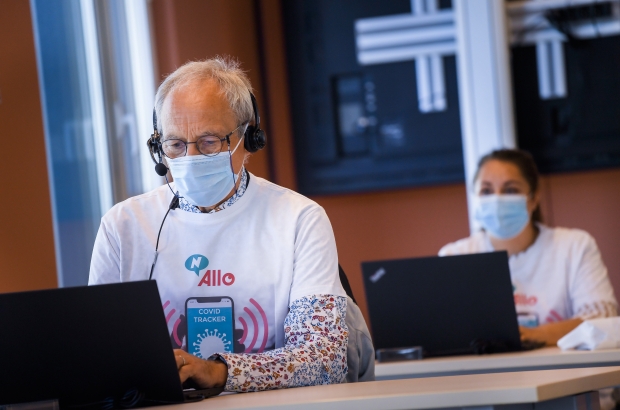- Daily & Weekly newsletters
- Buy & download The Bulletin
- Comment on our articles
OECD to carry out inquiry into Belgium’s handling of coronavirus crisis
The Organisation for Economic Co-operation and Development (OECD) has been asked to carry out an inquiry into Belgium's handling of the coronavirus pandemic in the hopes that such an analysis will allow the state to compare its response to that of other countries.
The organisation is doing so at the request of the Belgian federal government, De Standaard reports, including prime minister Alexander De Croo (Open VLD), health minister Frank Vandenbroucke (Vooruit) and interior minister Annelies Verlinden (CD&V).
The OECD will be examining the organisation of crisis management and recovery policies, as well as the concrete measures and their economic, social and health consequences.
Vandenbroucke explained that a thorough evaluation of how the Belgian system worked during the pandemic is useful, adding in a letter to parliament that with the eighth wave of the virus now passed, the time has come for such an analysis.
The OECD has already developed a framework to assess the Belgian approach to dealing with the coronavirus that will allow it to be compared at the international level. The findings are expected some time next year.
There were more than 4.6 million cases of the coronavirus recorded in Belgium, with a total of 32,976 deaths to date. A memorial for these victims is planned for Brussels.
The memorial will consist of 13 concrete benches, each 80 centimetres apart and arranged in a circle in Osseghem Park in Laeken. This is similar to those installed in the Flemish cities of Kortrijk (June 2021), Ghent (March 2022) and Lommel (November 2022).
Landscape architect Bas Smets is the designer, and the new pandemic monuments are inspired by his previous work for a monument to the victims of the 2016 Brussels bombings.
“In July 2020, I sent a message to Bas Smets,” said psychologist Uus Knops, who launched the initiative with fellow psychologist Elke Van Hoof.
“I found his monument in the Sonian Forest so captivating that I asked him if we could produce variations of it throughout the country.”
Knops reasoned that the virus had a similar effect on Belgium as those bombings: “The coronavirus is an attack on the whole country, because we've all lost someone or something to the pandemic. Loss can connect people, and it is precisely through this connection that resilience and hope emerge. That's what these circular memorials are for.”
Smets’ design for the pandemic monument is somewhat different than the 32 trees planted in the Sonian Forest, which also form a circle that is interrupted by nature.
“The idea of creating a family of monuments with monuments that mutate each time, like the virus that mutates, emerged very quickly,” Smets told RTBF.
“The monument, in each place, is presented in different variants, in different versions. But together they form a family.”
The memorial’s permit application is currently the subject of a public inquiry.
In the meantime, Belgium is winding down its vaccination campaigns and beginning to close the mega-centres that served to vaccinate as many people as possible as quickly as possible.
Three centres in Brussels will close by the end of the year in light of positive progress regarding epidemiological indicators of both the coronavirus and monkeypox, which led to a decrease in vaccination activity.
The Forest and Woluwe-Saint-Pierre centres will close on 30 November and the Molenbeek centre will close on 31 December 2022.
The Pachéco centre will remain open until 31 March 2023, but with reduced hours. Pharmacists, doctors and nurses, who have become increasingly involved in recent weeks, will handle vaccinations for coronavirus moving forward.
As for monkeypox vaccinations, these will still be offered in some hospitals.



















Comments
Based on the redacted, hidden, obscured and confusing figures released by the non-elected european commission after great pressure form elected officials, it turns out that Belgian citizens and residents have payed (or will pay) for a good 93 to 116 million vaccine doses through their taxes.
Astonishing number of doses for a population of 11.5 million souls?
Yes!
That's because the european commission has signed the purchase of 8 to 10 vaccines per european in the almost 90% redacted (text blackened over so it becomes unreadable) contracts with the vaccine manufacturers.
This beggars the questions:
1) where are and what will happen to the tens of millions of doses left unused.
2) why where 10 doses per person contracted since the beginning of the pandemic. We were all told to do the 2 vaccines and be free to do and go as we please, while our officials were ordering 10 doses for each one of us!.
Something very very fishy is going on here.
Belgium has already received 41 million doses and has administered 29.5 million of them.
So, about 11.5 million doses are sitting around in deep freeze costing money and slowly expiring, while the obligation is for Belgium to pay and receive another 52 to 75 million doses.
At about 20 euro a pop (the mentioned price may not be exact) plus transportation and logistics (warehousing, electricity for the freezers, security etc) which forces the costs to keep on mounting, we will end up paying a hell of a lot for basically nothing.
This is what the OECD extremely-well-payed-by-our-taxes officials, should be investigating and answering.
We have been and and we are still taken as fools for too long.
sorry correction at:
2) why *were* 10 doses....